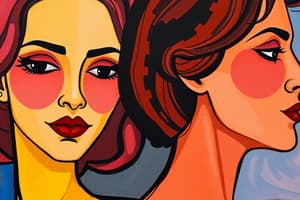Podcast
Questions and Answers
Which concept regarding gender is best described as an intensely personal, internal awareness of self that may or may not align with assigned sex?
Which concept regarding gender is best described as an intensely personal, internal awareness of self that may or may not align with assigned sex?
- Social gender
- Sex
- Identity (correct)
- Body
How does 'social gender' influence an individual's life?
How does 'social gender' influence an individual's life?
- It remains constant across all cultures, dictating identical gender roles for all individuals.
- It shapes how society perceives, interacts with, and attempts to mold an individual's gender expression through norms and expectations. (correct)
- It solely determines a person's biological characteristics at birth.
- It dictates a person's internal sense of self, regardless of societal expectations.
What is the primary assertion of liberal feminism?
What is the primary assertion of liberal feminism?
- Eliminating sex-based discrimination in all areas of life. (correct)
- The personal is political
- Capitalism is the root cause of women's oppression.
- Patriarchy is the enemy.
What is the main focus of Marxist feminism?
What is the main focus of Marxist feminism?
Which statement aligns with the radical feminist perspective?
Which statement aligns with the radical feminist perspective?
What distinguishes radical-libertarian feminists from radical-cultural feminists?
What distinguishes radical-libertarian feminists from radical-cultural feminists?
Which concept is central to socialist feminism?
Which concept is central to socialist feminism?
What is the main focus of VAWC (Violence Against Women and Children) concepts?
What is the main focus of VAWC (Violence Against Women and Children) concepts?
Which action would be classified as economic abuse under VAWC concepts?
Which action would be classified as economic abuse under VAWC concepts?
According to Republic Act No. 9262, what is a key provision for victims of violence and abuse?
According to Republic Act No. 9262, what is a key provision for victims of violence and abuse?
What is the significance of redefining rape in Republic Act No. 8353?
What is the significance of redefining rape in Republic Act No. 8353?
What is the primary goal of Comprehensive Sexuality Education?
What is the primary goal of Comprehensive Sexuality Education?
What is the main objective of the SOGIE Equality Bill?
What is the main objective of the SOGIE Equality Bill?
What is a common challenge in addressing VAWC cases?
What is a common challenge in addressing VAWC cases?
What discriminatory practice is explicitly prohibited under the Anti-Discrimination Act Senate Bill 689?
What discriminatory practice is explicitly prohibited under the Anti-Discrimination Act Senate Bill 689?
Flashcards
Sex
Sex
Refers to the biological basis of an individual, including primary characteristics, such as reproductive organs, and secondary characteristics, such as physique.
Gender
Gender
Refers to the sociological or cultural distinction associated with being male or female; a society-based concept with no biological basis, but rather traditions.
Gender Identity
Gender Identity
The name we use to convey our gender based on our deeply held, internal sense of self, falling into binary, nonbinary, or ungendered categories.
Social Gender
Social Gender
Signup and view all the flashcards
Feminism
Feminism
Signup and view all the flashcards
Liberal Feminism
Liberal Feminism
Signup and view all the flashcards
Marxist Feminism
Marxist Feminism
Signup and view all the flashcards
Radical Feminism
Radical Feminism
Signup and view all the flashcards
VAWC
VAWC
Signup and view all the flashcards
Republic Act No. 9262
Republic Act No. 9262
Signup and view all the flashcards
Circumstances of Rape
Circumstances of Rape
Signup and view all the flashcards
Comprehensive Sexuality Education
Comprehensive Sexuality Education
Signup and view all the flashcards
Safe Spaces Act
Safe Spaces Act
Signup and view all the flashcards
SOGIE
SOGIE
Signup and view all the flashcards
Gender Identity
Gender Identity
Signup and view all the flashcards
Study Notes
Intro to Gender
- Sex refers to the biological basis of an individual, including primary characteristics (reproductive organs) and secondary characteristics (physique).
- Gender refers to the sociological or cultural distinction associated with being male or female, based on traditions passed on in a society or culture.
- A person's gender may or may not match their sex (LGBT+++).
- Gender is the complex interrelationship between body, identity, and social gender.
- Body refers to one's experience of their body, how society genders bodies, and how others interact with one based on the body.
- Identity is the name to conveys an internal sense of self and gender, categorized as binary, nonbinary, or ungendered.
- Gender identity can correspond to or differ from the sex assigned at birth.
- Social gender is how one presents their gender in the world and how society perceives and interacts with their gender.
- Social gender includes gender roles, expectations, and how society tries to enforce conformity to current gender norms.
Gender Roles in Society
- Tasks were delegated based on physical strength with professions exclusive to men (engineer, architect) or women (culinary, clerk).
- Sports are no longer exclusive to men.
- In ancient times, only men could work while women stayed home; there were expectations for sons to work and bring wealth and honor, and a daughter's worth was based on marriage.
- Men received formal education while women did household chores and cultivated arts.
- Female goddesses represent beauty and family.
- Male gods represent strength, war, and supremacy.
- Male domination in religion leads to patriarchal societies, where men lead in religious practices.
Feminist Movements
- Feminism advocates for equal rights and opportunities for all genders and is defined by social, political, religious, and cultural perspectives
- Liberal feminism seeks to eliminate sex-based discrimination in all areas of life.
- Marxist feminism identifies capitalism as the enemy, as it is an economic and political system controlled by private owners for profit.
- Radical feminism considers the personal as political.
- Social feminism views patriarchy and capitalism as the enemies
Liberal Feminism
- Liberalism stresses individual independence, equality of opportunity, and the protection of individual rights.
- Liberal feminists advocate for "equality through social policy".
- Achievements include equal education, equal rights, suffrage, government representation, and involvement in social, political, and economic matters.
- Issues include gendered education, domestic roles for women, the gender wage gap, and promotional opportunities favoring men.
Marxist Feminism
- Women's liberation can only happen through abolishing the capitalist society based on economic equality by tackling capitalism to tackle patriarchy.
- Paying women for childcare and housework puts an economic value on what is largely women's work by ushering in communism.
- Capitalism exploits women through unpaid labor, as a reserve army of labor, through ideology, and the wage gap.
- Achievements include advocating for women's inclusion in the public sphere.
Radical Feminism
- Radical feminists believe patriarchy (men) is the enemy and women are oppressed through biology and their roles.
- Achievements include the right to pleasure and satisfaction, consciousness-raising, control over bodies and choices, rape crisis centers, lesbianism, and anti-hierarchy.
- Radical-libertarian feminists believe gender differences can be eradicated, and aim for androgyny.
- Radical-cultural feminists believe in the superiority of the feminine, celebrating characteristics associated with femininity.
Socialist Feminism
- Socialist feminism combines Marxist and radical feminism and advocates for reproductive rights, the abolition of the gender wage gap, division in the workplace, and childcare centers.
VAWC Concepts (Violence Against Women and Children)
- Violence Against Women and Children means any gender-based violence resulting in physical, sexual, or psychological harm or suffering, including threats.
- Gender-based violence is violence inflicted on women because of their sex.
- Discrimination against women includes any gender-based distinction, exclusion, or restriction.
- Types of violence include psychological, sexual abuse, physical violence, and economic abuse.
- UN recommends prioritizing women in policy change.
VAWC Bills & Laws
- Republic Act No. 9262, the Anti-violence against women and their children act of 2004, addresses violence against women and children in the Philippines.
- Key Provisions include protecting victims, imposing criminal penalties, recognizing battered woman syndrome as a defense, and establishing support services.
- Republic Act No. 8353, the Anti-rape law of 1997, considers rape a crime against persons, violating well-being beyond virginity or purity.
- Accurate rape statistics are hard to obtain because victims don't report due to embarrassment or fear.
- The law expanded the definition of rape beyond penile-vaginal penetration.
Comprehensive Sexuality Education
- Comprehensive Sexuality Education aims to integrate compulsory sexuality education at all educational levels and focuses on normalizing discussions around sexuality.
- Core Principles include informed choice, access to healthcare and services, and respect for human rights.
- Safe Spaces Act covers all forms of gender-based sexual harassment (GBSH) committed in public spaces, educational/training institutions, workplaces, and online spaces.
- Acts of gender-based sexual harassment in public spaces include catcalling, sexist remarks, misogynistic, homophobic, and transphobic remarks.
Challenges to VAWC
- Challenges to VAWC include underreporting due to stigma, shame, fear, lack of trust, the normalization of violence, cultural and social norms, and weak laws and enforcement.
SOGIE Concepts, Bills and Laws
- SOGIE (Sexual Orientation, Gender Identity, and Expression) honors the fluidity of identities in the LGBTQ+ community.
- Gender Identity refers to how one thinks about themselves, while Gender Expression is how one outwardly displays one's gender.
- Gender Conforming: When one's gender expression aligns with their gender identity.
- A person's sexual orientation refers to who they are emotionally, romantically, or sexually attracted to.
SOGIE and Human Rights
- There are 64 countries with laws criminalizing homosexuality, traced back to European colonization.
- Some countries sentence people to death for consensual same-sex acts.
- Discrimination includes limited access to healthcare, difficulty in securing employment, bullying, and harassment.
- Gender Equality Movement: Pride started as A protest in June 28 1969, as The Stonewall Inn was raided by the police, due to what one wore did not “match” their gender according to their ID.
Sogie Bill and Laws
- The SOGIE Bill and Laws fight for anti-discrimination legislation for over 20 years since it was first filed in congress.
- The SOGIE Bill is for individuals and communities that experience human rights violations.
- Discriminatory Practices include promoting stigma in the media, refusing admission to educational institutions, and including SOGIE in hiring criteria.
- Additional practices include denying access to health services or insurance, forcing medical/psychological examinations, and denying government licenses.
Penalties for SOGIE Bill and Laws
- Penalties for discriminatory practice: a fine of P100,000-P500,000 and/or imprisonment of 1-12 years.
- Community service may be assigned for any of 10 prohibited acts, serving in human rights education.
Philippines HIV and AIDS Policy Act (RA 11168)
- The State shall respect, protect, and promote human rights to help provide effective response to the HIV and AIDS situation.
- HIV and AIDS education and information dissemination should form part the right to health.
Protection of Human Rights (HIV/AIDS)
- The country's response to the IV and AIDS situation shall be anchored on human rights.
- Public health concerns shall align with internationally-recognized instruments and standards.
- Education is a Right to Health and Information.
- Information dissemination shall form part of the delivery of health services.
Discriminatory Acts and Practices (HIV/AIDS)
- In the workplace, discrimination includes rejection of job application, termination of employment.
- A discriminatory practice can include Refusal of admission, expulsion, segregation in Learning Institutions.
- A discriminatory practice can include Restrictions on travel within the Philippines.
- Some more examples of Discriminatory policies or Acts can include – Restrictions on Shelter, Prohibition from Seeking or Holding Public Office, Exclusion from Credit and Insurance Services
- In hospitals and health institutions, Denial of health or being charged with a higher fee.
- There will also be A Denial of Burial Services.
- Forms of Act of Bullying - name-calling, in social media and other online portals.
Studying That Suits You
Use AI to generate personalized quizzes and flashcards to suit your learning preferences.




